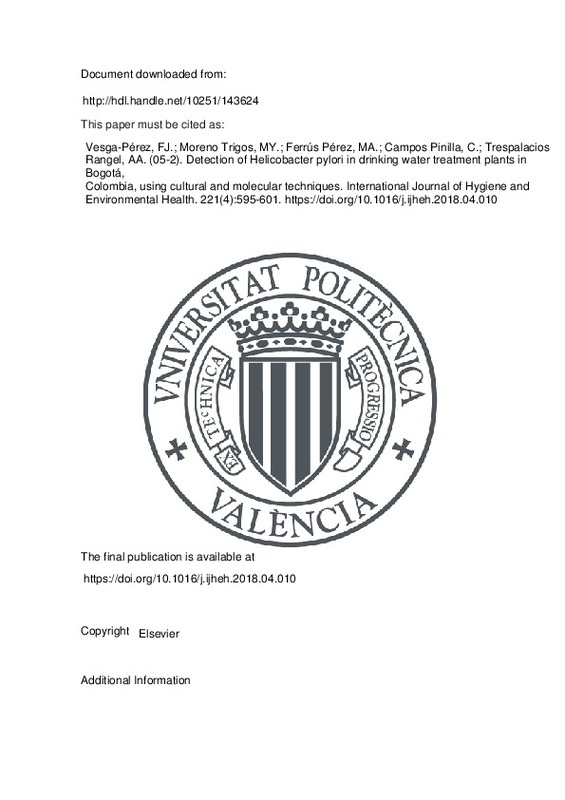JavaScript is disabled for your browser. Some features of this site may not work without it.
Buscar en RiuNet
Listar
Mi cuenta
Estadísticas
Ayuda RiuNet
Admin. UPV
Detection of Helicobacter pylori in drinking water treatment plants in Bogotá, Colombia, using cultural and molecular techniques
Mostrar el registro sencillo del ítem
Ficheros en el ítem
| dc.contributor.author | Vesga-Pérez, Fidson Juarismy
|
es_ES |
| dc.contributor.author | Moreno Trigos, Mª Yolanda
|
es_ES |
| dc.contributor.author | Ferrús Pérez, Mª Antonia
|
es_ES |
| dc.contributor.author | Campos Pinilla, Claudia
|
es_ES |
| dc.contributor.author | Trespalacios Rangel, Alba Alicia
|
es_ES |
| dc.date.accessioned | 2020-05-19T03:02:45Z | |
| dc.date.available | 2020-05-19T03:02:45Z | |
| dc.date.issued | 2018-05 | es_ES |
| dc.identifier.issn | 1438-4639 | es_ES |
| dc.identifier.uri | http://hdl.handle.net/10251/143624 | |
| dc.description.abstract | [EN] Helicobacter pylori is one of the most common causes of chronic bacterial infection in humans, and a predisposing factor for peptic ulcer and gastric cancer. The infection has been consistently associated with lack of access to clean water and proper sanitation. H. pylori has been detected in surface water, wastewater and drinking water. However, its ability to survive in an infectious state in the environment is hindered because it rapidly loses its cultivability. The aim of this study was to determine the presence of cultivable and therefore viable H. pylori in influent and effluent water from drinking water treatment plants (DWTP). A total of 310 influent and effluent water samples were collected from three drinking water treatment plants located at Bogota city, Colombia. Specific detection of H. pylori was achieved by culture, qPCR and FISH techniques. Fifty-six positive H. pylori cultures were obtained from the water samples. Characteristic colonies were covered by the growth of a large number of other bacteria present In the water samples, making isolation difficult to perform. Thus, the mixed cultures were submitted to Fluorescent in situ Hybridization (FISH) and qPCR analysis, followed by sequencing of the amplicons for confirmation. By qPCR, 77 water samples, both from the influent and the effluent, were positive for the presence of H. pylori. The results of our study demonstrate that viable H. pylori cells were present In both, influent and effluent water samples obtained from drinking water treatment plants in Bogota and provide further evidence that contaminated water may act as a transmission vehicle for H. pylori. Moreover, FISH and qPCR methods result rapid and specific techniques to identify H. pylori from complex environmental samples such as influent water. | es_ES |
| dc.description.sponsorship | This work was supported by COLCIENCIAS, Project 120356933870, CTO 642-2013, Colombia and the Spanish Ministry of Economy and Competitiveness AGL2014/53875-R Project, Spain. We greatly acknowledge the collaboration of the Aqueduct and Sewage Company of Bogota (EAB), Colombia. | es_ES |
| dc.language | Inglés | es_ES |
| dc.publisher | Elsevier | es_ES |
| dc.relation.ispartof | International Journal of Hygiene and Environmental Health | es_ES |
| dc.rights | Reconocimiento - No comercial - Sin obra derivada (by-nc-nd) | es_ES |
| dc.subject | Helicobacter pylori | es_ES |
| dc.subject | Detection | es_ES |
| dc.subject | Culture | es_ES |
| dc.subject | QPCR | es_ES |
| dc.subject | FISH | es_ES |
| dc.subject | Drinking water treatment plants | es_ES |
| dc.subject.classification | MICROBIOLOGIA | es_ES |
| dc.title | Detection of Helicobacter pylori in drinking water treatment plants in Bogotá, Colombia, using cultural and molecular techniques | es_ES |
| dc.type | Artículo | es_ES |
| dc.identifier.doi | 10.1016/j.ijheh.2018.04.010 | es_ES |
| dc.relation.projectID | info:eu-repo/grantAgreement/COLCIENCIAS//120356933870/ | es_ES |
| dc.relation.projectID | info:eu-repo/grantAgreement/COLCIENCIAS//CTO 642-2013/ | es_ES |
| dc.relation.projectID | info:eu-repo/grantAgreement/MINECO//AGL2014-53875-R/ES/H. PYLORI Y OTROS HELICOBACTERS PATOGENOS EN AGUAS Y ALIMENTOS: DESARROLLO Y APLICACION DE HERRAMIENTAS MOLECULARES DIRIGIDAS A LA EVALUACION DEL RIESGO PARA EL CONSUMIDOR/ | es_ES |
| dc.rights.accessRights | Abierto | es_ES |
| dc.contributor.affiliation | Universitat Politècnica de València. Instituto Universitario de Ingeniería del Agua y del Medio Ambiente - Institut Universitari d'Enginyeria de l'Aigua i Medi Ambient | es_ES |
| dc.contributor.affiliation | Universitat Politècnica de València. Departamento de Biotecnología - Departament de Biotecnologia | es_ES |
| dc.description.bibliographicCitation | Vesga-Pérez, FJ.; Moreno Trigos, MY.; Ferrús Pérez, MA.; Campos Pinilla, C.; Trespalacios Rangel, AA. (2018). Detection of Helicobacter pylori in drinking water treatment plants in Bogotá, Colombia, using cultural and molecular techniques. International Journal of Hygiene and Environmental Health. 221(4):595-601. https://doi.org/10.1016/j.ijheh.2018.04.010 | es_ES |
| dc.description.accrualMethod | S | es_ES |
| dc.relation.publisherversion | https://doi.org/10.1016/j.ijheh.2018.04.010 | es_ES |
| dc.description.upvformatpinicio | 595 | es_ES |
| dc.description.upvformatpfin | 601 | es_ES |
| dc.type.version | info:eu-repo/semantics/publishedVersion | es_ES |
| dc.description.volume | 221 | es_ES |
| dc.description.issue | 4 | es_ES |
| dc.relation.pasarela | S\361615 | es_ES |
| dc.contributor.funder | Ministerio de Economía y Empresa | es_ES |
| dc.contributor.funder | Departamento Administrativo de Ciencia, Tecnología e Innovación, Colombia | es_ES |







![[Cerrado]](/themes/UPV/images/candado.png)

